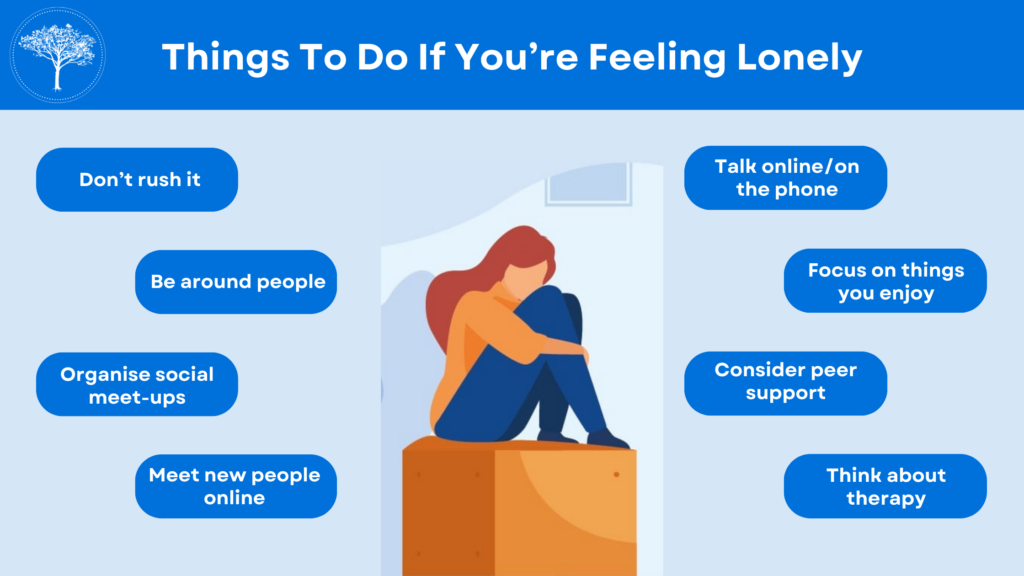Addiction is a pervasive issue that affects millions of people worldwide. One of addiction’s most significant effects is its isolating impact on people.
Addiction’s suffocating hold creates a bubble around its victims, separating them from their social networks and leading to feelings of loneliness, depression, and hopelessness.
Keep reading to explore the loneliness of addiction and ways to overcome the cycle of loneliness during addiction recovery!
Relevance Behavioral Health is a drug addiction and mental health rehab in New Jersey. Contact us today to learn more about our top-rated rehab in Monmouth County.
Join supportive programs that connect you with others who understand.
How Is Loneliness Linked to Substance Abuse and Addiction?
Lonely people can use drugs and alcohol for self-medication.
When someone feels disconnected from the world, they may turn to substances to fill the void and make them feel better.
This increases their dependence on substances, leading to more frequent use and, eventually, addiction.

Addiction can be so powerful that it consumes a person’s life and drives away all the people they love.
Addicts often fear being judged or shamed by their loved ones, leading to isolation.
They also may worry about letting down others if they relapse or feel embarrassed about their addiction and don’t want anyone to know.
In addition, the lifestyle of an addict can lead to social isolation.
They may stay up late drinking or using drugs, sleep during the day, and distance themselves from those around them.
This behavior reinforces feelings of loneliness and isolation.
If you or someone you know is struggling with addiction and the resulting loneliness and isolation, know that you are not alone.
Here are some tips that can help you overcome these challenges.
It’s never easy to admit that we suffer from loneliness and isolation.
But the first and most crucial step in overcoming these challenges is acknowledging their existence.
Openly admitting to how substance abuse has affected your relationships and social life takes courage, but acceptance is the key to healing.
Taking time for yourself is crucial in addiction recovery. It’s an opportunity to reconnect with yourself, your thoughts, and your feelings.
Being alone and enjoying your company opens doors to rediscovering your passions, hobbies, and interests.
Self-care, whether through exercise, meditation, or art, can help you prioritize your emotional and mental health.
Joining a support group like Alcoholics Anonymous or Narcotics Anonymous can be life-changing.
It’s a safe space to discuss your struggles and gain encouragement and motivation from others in similar situations.
Social support will provide you with a plethora of guidance, therapy, and advice on how to cope with loneliness and isolation.
Loneliness and isolation occur when there is a lack of meaningful connections with others.
Addiction often creates a gap between an individual and their loved ones.
Building new connections and repairing existing ones can be difficult, but overcoming addiction-induced loneliness and isolation is necessary.
Start by participating in group activities or volunteer programs.
Being a part of something bigger than yourself can help you feel less isolated and build self-confidence.
Nature is known for its therapeutic and healing properties. It’s a space to disconnect from the chaos of life, relax, and rejuvenate.
Reconnecting with nature can help you find new meaning and perspective in life.
From gardening to birdwatching, nature can be critical to finding happiness and fulfillment.
Addiction and loneliness can cause intense feelings of guilt and shame.
It’s essential to remember that you’re not alone in these feelings, but more importantly, to forgive yourself.
Self-forgiveness is a process that takes patience and time, but it’s a crucial step in healing.
Remember, you are not your addiction; growth and healing are always possible.
Overcoming addiction-induced loneliness and isolation seems impossible.
If you’re struggling to cope with these challenges or feeling overwhelmed, seeking professional help is okay.
Professional treatment programs can help you navigate this tiresome journey and provide the emotional support you need.
Remember, no one is alone in this journey, and seeking professional help is a powerful way to take control of your life.
Relevance Behavioral Health is Here to Help Overcome the Loneliness of Addiction
We understand that overcoming addiction-induced loneliness and isolation can be a challenging journey.
At Relevance Behavioral Health, we strive to create a supportive environment where individuals can learn how to manage their addiction and develop healthy coping mechanisms.
We believe that with the proper support, anyone can overcome loneliness and isolation because of addiction.
Our facility offers a variety of programs, including a teen and adolescent group, family therapy, recovery coaching, and more.
Contact us today to learn more about Relevance addiction services and how we can help you or your loved one on the road to recovery.